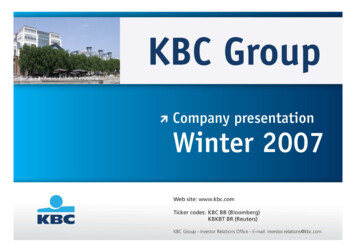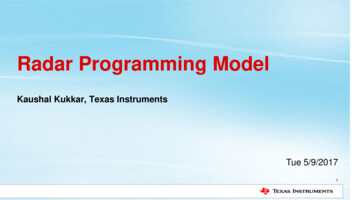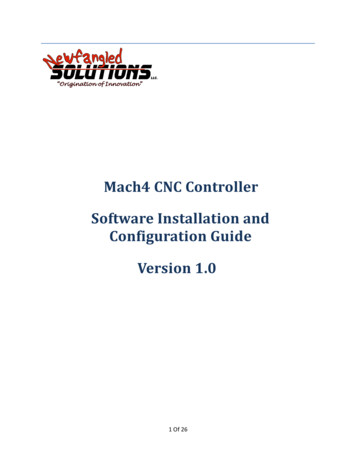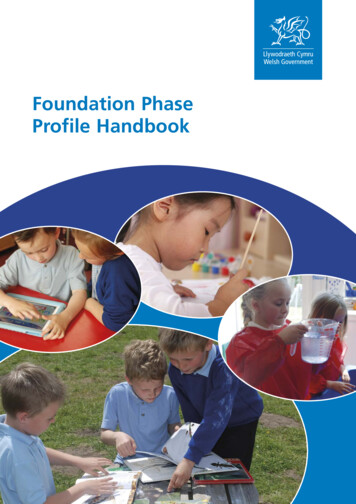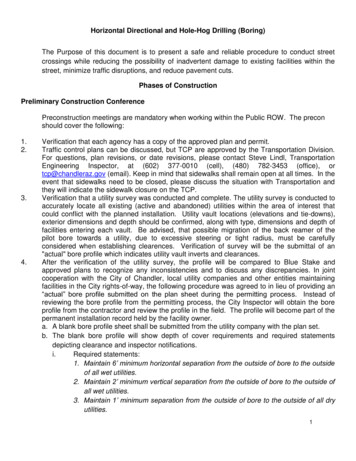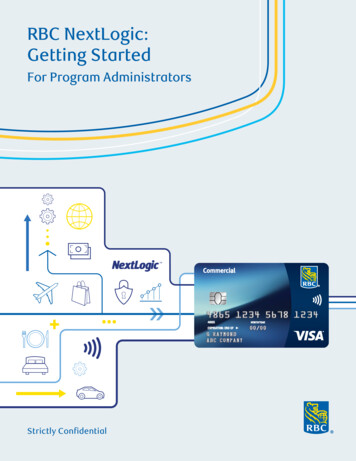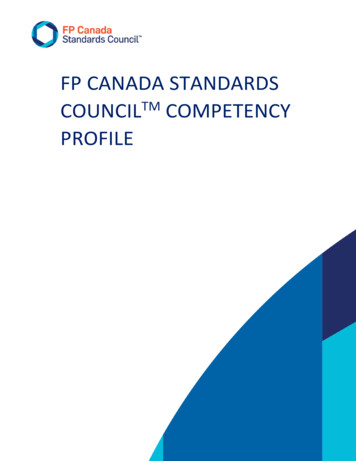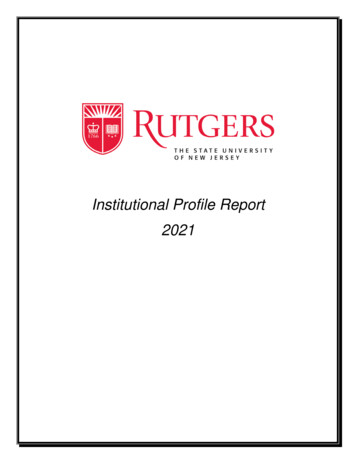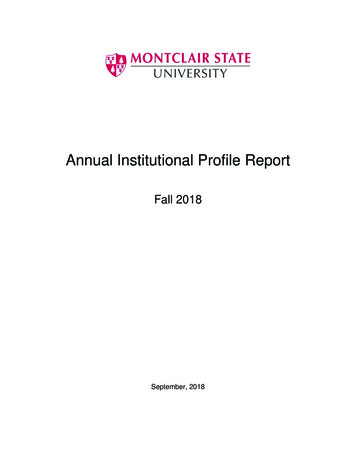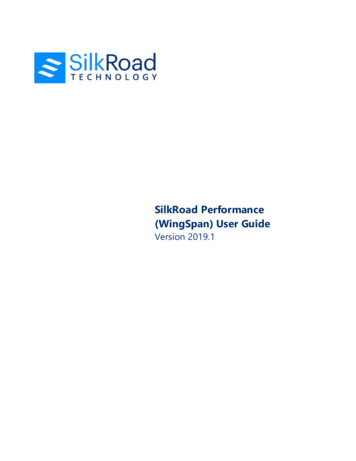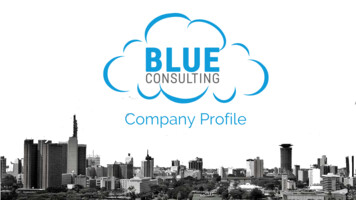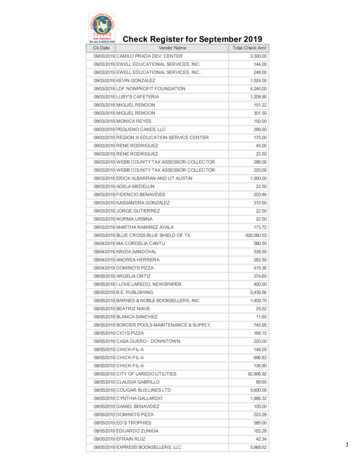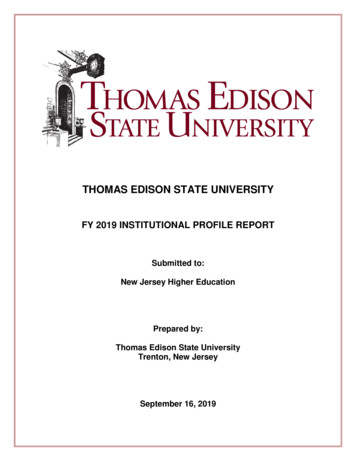
Transcription
THOMAS EDISON STATE UNIVERSITYFY 2019 INSTITUTIONAL PROFILE REPORTSubmitted to:New Jersey Higher EducationPrepared by:Thomas Edison State UniversityTrenton, New JerseySeptember 16, 2019
TABLE OF CONTENTSINSTITUTIONAL PROFILE SUMMARY. . . . . . . . . . . . . . . . . . . . . . .iTHOMAS EDISON STATE UNIVERSITY MISSION & PURPOSE . .iiA. ACCREDITATION STATUS. . . . . . . . . . . . . . . . . . . . . . . . . . . . . .11. Institutional accreditation . . . . . . . . . . . . . . . . . . . . . . . . . . . .2. Professional accreditation . . . . . . . . . . . . . . . . . . . . . . . . . . . .11B. NUMBER OF STUDENTS SERVED. . . . . . . . . . . . . . . . . . . . . . .1. Number of undergraduates by attendance status . . . . . . . . . . . . . .2. Number of graduate students by attendance status. . . . . . . . . . . .3. Number of noncredit students served. . . . . . . . . . . . . . . . . . . . .4. Unduplicated count of students enrolled during the year. . . . . . . .22222C. CHARACTERISTICS OF UNDERGRADUATE STUDENTS . . . . . 31. Mean math, reading, and writing SAT scores. . . . . . . . . . . . . . . .2. Enrollment in remediation courses by subject area. . . . . . . . . . . .3. Race/ethnicity, gender, and age (separately). . . . . . . . . . . . . . . . .4. Numbers of students receiving financial assistance under eachfederal-, state- & institution-funded aid program. . . . . . . . . . . . .5. Percentage of students who are New Jersey residents . . . . . . . . . .333D. STUDENT OUTCOMES . . . . . . . . . . . . . . . . . . . . . . . . . . . . . . . . . . .61. Graduation rates by race/ethnicity category (Four-, five- and sixyear graduation rate) . . . . . . . . . . . . . . . . . . . . . . . . . . . . . .2. Third-semester retention rates (by attendance status). . . . . . . . . .3. Time-to-degree completion . . . . . . . . . . . . . . . . . . . . . . . . . . . . . .4. Student Learning Outcomes . . . . . . . . . . . . . . . . . . . . . . . . . . . . .6667E. MENTOR CHARACTERISTICS . . . . . . . . . . . . . . . . . . . . . . . . . .91. Full-time faculty by race/ethnicity, gender, academic rank andtenure status (simultaneously) . . . . . . . . . . . . . . . . . . . . . . . . . . .2. Percentage of course sections taught by full-time faculty . . . . . .3. Ratio of full- to part-time faculty . . . . . . . . . . . . . . . . . . . . . . . . .4. Mentor characteristics: race/ethnicity and gender . . . . . . . . . . . .999945
F. CHARACTERISTICS OF THE BOARD OF TRUSTEES . . . . . . . . . 101. Race/ethnicity and gender (simultaneously). . . . . . . . . . . . . . . . . 102. List of trustees/governors with titles and affiliations . . . . . . . . . . . 103. URL Information . . . . . . . . . . . . . . . . . . . . . . . . . . . . . . . . . . . . . 10G. A PROFILE OF THE INSTITUTION . . . . . . . . . . . . . . . . . . . . . . . . .111. Degree and certificate programs . . . . . . . . . . . . . . . . . . . . . . . . . .2. Other . . . . . . . . . . . . . . . . . . . . . . . . . . . . . . . . . . . . . . . . . . . . . .1112H. MAJOR RESEARCH AND PUBLIC SERVICE ACTIVITIES . . . . .13I. MAJOR CAPITAL PROJECTS UNDERWAY IN FISCAL 2018 . . .15OTHER INSTITUTIONAL INFORMATION . . . . . . . . . . . . . . . . . . . . .16
THOMAS EDISON STATE UNIVERSITYFY 2019 INSTITUTIONAL PROFILE REPORTINSTITUTIONAL PROFILE SUMMARYEstablished in 1972, Thomas Edison State University provides distinctive undergraduate andgraduate education for self-directed adults through flexible, high-quality collegiate learning andassessment opportunities. The University is one of New Jersey’s senior public institutions ofhigher education and was granted university status by the New Jersey Secretary of HigherEducation in December 2015. Thomas Edison State University is the only University in NewJersey dedicated exclusively for adults and offers degree programs at the associate, bachelor’s,master’s, and doctorate level, undergraduate and graduate certificates, and a noncredit professionalcertificate.For more than four decades, the University has pioneered the use of the latest technologies todevelop high-quality educational programs for adults, and has served as a national leader in theassessment of adult learning. The New York Times called Thomas Edison State University “thecollege that paved the way for flexibility.”The entire academic program at the University revolves around the unique needs of adult learners.Students earn credit through a variety of methods designed exclusively for adult learners, includingonline courses, guided independent study, examination programs, transferring credits earned fromother regionally accredited institutions, earning credit for professional and/or military training, andby demonstrating university-level knowledge acquired outside a traditional classroom. ThomasEdison State University makes it possible for adult students to pursue their education withoutsacrificing their personal or professional responsibilities.Merodie A. Hancock, PhDPresidentSeptember 2019
Thomas Edison State UniversityMISSION & PURPOSEMissionThomas Edison State University provides distinctive undergraduate and graduate education forself-directed adults through flexible, high-quality collegiate learning and assessmentopportunities.PurposeThomas Edison State University was established as Edison College in 1972 by the State of NewJersey and chartered by the New Jersey Board of Higher Education. The University was foundedfor the purpose of providing diverse and alternative methods of achieving a collegiate educationof the highest quality for mature adults. To this end, the University seeks:I.To provide curricula and degree opportunities of appropriate level and compositionconsistent with the aspirations of our students, the public welfare, and the highestqualitative standards of American higher education.II.To create a system of college-level learning opportunities for adults by organizingcollegiate and sponsored non-collegiate instruction into coherent degree strategies.III.To make available educationally valid learning opportunities which serve as alternatives tocollege classroom study and which are appropriate to the varied needs and learning stylesof adults.IV.To develop and implement processes for the valid and reliable assessment of experientialand extra-collegiate college-level learning, and to provide appropriate academicrecognition for knowledge so identified consistent with high standards of quality and rigor.V.To serve higher education and the public interest as a center of innovation, information,policy formulation and advocacy on behalf of adult learners.VI.To fulfill the public service obligation inherent to American institutions of highereducation.VII.To conduct its affairs in a manner which acknowledges the maturity, autonomy, and dignityof its students; assures a portal of access to higher education for adult learners; andcelebrates the values, diversity and high qualitative standards of American highereducation.ii
Thomas Edison State UniversityA. ACCREDITATION STATUS1. Institutional accreditation. Thomas Edison State University is regionally accredited by theMiddle States Commission on Higher Education, the accrediting body for colleges anduniversities in the middle states region. This accreditation is part of a national system of qualityassurance that requires colleges and universities to reach a common understanding andagreement as to the standards of quality for American higher education. During FY 2018, theMSCHE has accepted the University’s Periodic Review Report (PRR) and reaffirmed theUniversity’s accreditation through 2022.2. Professional accreditation. The W. Cary Edwards School of Nursing’s baccalaureate degreeprogram in nursing, master’s degree program in nursing, and doctor of nursing practice programare accredited by the Commission on Collegiate Nursing Education (CCNE). Thebaccalaureate and master’s degree accreditation with CCNE is valid through 2024. The doctorof nursing practice program through CCNE is valid through 2023. The W. Cary EdwardsSchool of Nursing’s baccalaureate degree program in nursing is accredited by the New JerseyBoard of Nursing through 2022.Thomas Edison State University’s Master of Arts in Educational Leadership Program, which isdesigned to prepare educators for roles in school leadership, was awarded Teacher EducationAccreditation Council (TEAC) accreditation by the Inquiry Brief Commission of the Councilfor the Accreditation of Educator Preparation (CAEP) for a period of seven years, from April2015 through April 2022. This accreditation certifies that the forenamed professional educationprogram has provided evidence that the program adheres to TEAC’s quality principles.Thomas Edison State University’s Bachelor of Science in Business Administration, Master ofBusiness Administration, Master of Science in Management, and Master of Science in HumanResources Management degree programs are accredited by the Accreditation Council forBusiness Schools and Programs (ACBSP). The accreditation status is effective as of April 27,2017.Thomas Edison State University bachelor's degrees in Nuclear Energy Engineering Technologyand Electronics System Engineering Technology are accredited by the Engineering TechnologyAccreditation Commission of the Accreditation Board for Engineering and Technology(ABET). The accreditation status is effective until August 2023. ABET is a specializedaccrediting agency recognized by the Council for Higher Education Accreditation (CHEA).Thomas Edison State University's associate degree program and undergraduate certificate inPolysomnography were awarded continuing accreditation by the Commission on Accreditationof Allied Health Education Programs (CAAHEP) for a period of ten years, from March 17,2017 to 2022.1
Thomas Edison State UniversityB. NUMBER OF STUDENTS SERVED1. Number of undergraduates by attendance statusThomas Edison State UniversityTable II.B.1:Undergraduate Enrollment by Attendance Status, Fall FY 2%Total10,217100%Source: IPEDS Fall Enrollment SurveyPlease note, Thomas Edison State University’s Fall 2018 IPEDS Enrollment Survey counts arebased on only the enrollment counts as of October. In the past, the Fall Enrollment Survey countsincluded all students who enrolled during the fiscal year.2. Number of graduate students by attendance statusThomas Edison State UniversityTable II.B.2:Graduate Enrollment by Attendance Status, Fall FY 7.1%717100%Source: IPEDS Fall Enrollment SurveyPlease note, Thomas Edison State University’s Fall 2018 IPEDS Enrollment Survey counts arebased on only the enrollment counts as of October. In the past, the Fall Enrollment Survey countsincluded all students who enrolled during the fiscal year.3. Number of noncredit students served. During FY 2019, there were 41 students who tooknoncredit courses at the University.4. Unduplicated count of students enrolled during the year. During FY 2018, there were14,272 students enrolled at the University.2
Thomas Edison State UniversityC. CHARACTERISTICS OF UNDERGRADUATE STUDENTS1. Mean math, reading, and writing SAT scores. This section is not applicable to ThomasEdison State University.2. Enrollment in remediation courses by subject area. This section is not applicable toThomas Edison State University.3. Race/ethnicity, gender, and age (separately). Profiles of the undergraduate students byrace/ethnicity, gender, and age are presented in the tables below.Thomas Edison State UniversityTable II.C.3.a:Undergraduate Enrollment by Race/Ethnicity, Fall FY 2018Race/EthnicityWhiteBlackHispanicAsian*American IndianAlienRace 22.6%1013.0%77 .5%1.3%17.7%100.0%* Note: Asian includes Pacific Islanders and Unknown includes 2 or More Races.Source: IPEDS Fall Enrollment SurveyPlease note, Thomas Edison State University’s Fall 2018 IPEDS Enrollment Survey counts arebased on only the enrollment counts as of October. In the past, the Fall Enrollment Survey countsincluded all students who enrolled during the fiscal year.Thomas Edison State UniversityTable II.C.3.b:Undergraduate Enrollment by Gender, Fall FY 100.0%10,140100.0%10,217100.0%TotalTotalSource: IPEDS Fall Enrollment SurveyPlease note, Thomas Edison State University’s Fall 2018 IPEDS Enrollment Survey counts are based on only theenrollment counts as of October. In the past, the Fall Enrollment Survey counts included all students whoenrolled during the fiscal year.3
Thomas Edison State UniversityThomas Edison State UniversityTable II.C.3.c:Undergraduate Enrollment by Age, Fall FY 2018AgeLT 1818-1920-2122-2425-2930-3435-3940-4950-6465 6.5%79.1%11.3%77 .6%0.3%0.0%100.0%Source: IPEDS Fall Enrollment Survey. Please note, Thomas Edison State University’s Fall 2018 IPEDSEnrollment Survey counts are based on only the enrollment counts as of October. In the past, the FallEnrollment Survey counts included all students who enrolled during the fiscal year.4. Number of students receiving financial assistance under each federal-, state-, andinstitution-funded aid program. The number of students receiving financial assistance ispresented in the table below.Thomas Edison State UniversityTable II.C.4:Financial Aid from Federal, State & Institution-Funded Programs, AY 2017-18FEDERAL PROGRAMSPell GrantsUniversity Work StudyPerkins LoansSEOGPLUS LoansStafford Loans (Subsidized)Stafford Loans (Unsubsidized)SMART & ACG or otherSTATE PROGRAMSTuition Aid Grants (TAG)Educational Opportunity Fund (EOF)Outstanding Scholars (OSRP)Distinguished ScholarsUrban ScholarsNJ STARSNJCLASS LoansINSTITUTIONAL PROGRAMSGrants/ScholarshipsLoansSource: NJIPEDS Form #41 Student Financial Aid Report4RecipientsDollars( ) 03,096.58-
Thomas Edison State University5. Percentage of students who are New Jersey Residents. Due to the number of activemilitary students enrolled, the University examines residence by military status. As the tablebelow indicates, among nonmilitary students, 56 percent of the enrolled students were NewJersey residents. Five percent of the military students were also N.J. residents.Thomas Edison State UniversityTable II.C.5:FY 2018 Enrollment by Military Status and ResidenceNon-MilitaryActive MilitaryTotalResidenceN%N%NNew JerseyOut of 6%1.7%100.0%Source: Thomas Edison State University, FY 2018 President’s Annual Report to the Board ofTrustees.5
Thomas Edison State UniversityD. STUDENT OUTCOMES1. Graduation rates:a. Four-, five-, and six-year graduation rate by race/ethnicity (senior publics). Thissection is not applicable to Thomas Edison State University.b. Two-year graduation rate (community colleges). This section is not applicable toThomas Edison State University.c. Three-year graduation and transfer rate by race/ethnicity (community colleges).This section is not applicable to Thomas Edison State University.2. Third-semester retention rates (by attendance status). This section is not applicable toThomas Edison State University.3. Time-to-Degree Completion. Since Thomas Edison State University enrolls primarily adultstudents who often bring in credit upon enrollment, the University monitors time-to-degreecompletion to examine how long it takes graduates to earn a degree from the University.As presented in Table II.D:3a below, during FY 2019, the associate degree graduates took, onaverage, 4.0 years to graduate, the bachelor’s degree graduates took 4.2 years to graduate, themaster’s degree graduates took 3.4 years to graduate, and the doctoral degree graduates took2.0 years to graduate.Thomas Edison State UniversityTable II.D.3.a:FY 2019 Graduates Time-to-Degree Completion by Degree 3.4Doctorate2.2Source: Thomas Edison State University, FY 2019 Year End Data File: Degrees Awarded.The University also monitors time-to-degree completion by examining differences between instate and out-of-state students. The time-to-degree completion for in-state versus out-of-statestudents is presented below.Thomas Edison State UniversityTable II.D.3.b:FY 2019 Graduates Time-to-Degree Completion by Degree Level and ResidenceNJ ResidentsOut-of-State ��s3.53.2Source: Thomas Edison State University, FY 2019 Year End Data File: Degrees Awarded.6Doctorate2.22.1
Thomas Edison State University4. Student Learning Outcomes. In keeping with its mission, Thomas Edison State Universityis committed to maintaining high standards of academic integrity and of quality service to itsstudents. To achieve this goal, the University engages in outcomes assessment, a processthrough which the effectiveness of the University and its programs is evaluated againstinstitutionally determined standards. Thomas Edison State University's institutional outcomesare closely mapped to the Essential Learning Outcomes of the Liberal Education and America'sPromise (LEAP) initiative as documented by the Association of American Colleges andUniversities. The Academic Council has approved specific institutional learning outcomes forall undergraduate students and graduate students.a. Undergraduate Institutional Learning OutcomesAll Thomas Edison State University students who graduate from bachelor's degree programswill have the following competencies: Written CommunicationCommunicate ideas effectively in writing using text, data and images for addressingglobally complex challenges. Oral CommunicationCommunicate ideas effectively orally using multiple modes of communication, asappropriate. Information LiteracyIdentify, locate, evaluate and effectively and responsibly use and share information forthe problem at hand. Quantitative Reasoning/LiteracyDemonstrate competency and comfort in working with numerical data, create complexand refined arguments supported by quantitative evidence, and clearly communicatethose arguments in a variety of formats, as appropriate. Diversity/Intercultural LiteracyRecognize that they are members of a world community and demonstrate interculturalknowledge, skills and attitudes that support effective and appropriate interaction in avariety of cultural contexts. Ethical LeadershipAssess their own ethical values and the social context of a given situation, recognizeethical issues in a variety of settings, apply ethical principles to ethical dilemmas, andconsider the ramifications of alternative actions. Critical ThinkingCritically explore issues and ideas, frame events, consider evidence and analyzeassumptions before accepting or formulating an opinion or conclusion.b. Institutional Graduate Learning OutcomesAll Thomas Edison State University students who graduate from advanced-level degreeprograms will be able to:7
Thomas Edison State University Apply in-depth knowledge to the major questions, theories, debates, and methodologiesin their organization, field or profession. Use critical analysis and research to make informed decisions and to improve anorganization, field, or profession. Communicate effectively to positively impact an organization, field, or profession. Apply ethical principles and theories in research, evaluation, organizational culture, andcommunities. Interpret cultural influences in organizations and communities. Create sophisticated arguments supported by quantitative evidence.c. Programmatic Learning OutcomesProgrammatic learning outcomes, focusing on degree specific learning goals and objectives,have also been established within each school at the undergraduate and graduate degree levels.8
Thomas Edison State UniversityE. MENTOR CHARACTERISTICS1. Full-time faculty by race/ethnicity, gender, academic rank and tenure status(simultaneously). This section is not applicable to Thomas Edison State University.2. Percentage of course sections taught by full-time faculty. This section is not applicableto Thomas Edison State University.3. Ratio of full- to part-time faculty. This section is not applicable to Thomas Edison StateUniversity.4. Mentor characteristics: race/ethnicity and gender. Thomas Edison State Universitysigns letters-of-agreement with subject-matter experts. These mentors and consultants engagewith the academic units of the University in various ways: development and/or assessment intest construction, portfolio assessment, facilitating courses (e.g., Guided Study and online),pre-graduation conferences, demonstration of currency, practicum, nursing performanceexaminations, and program evaluations. During FY 2019, there were 724 mentors. The genderand race/ethnicity of the mentors are presented below.Thomas Edison State UniversityTable II.E.4.a:Gender of Mentors, FY knownTotalThomas Edison State UniversityTable II.E.4.b:Race/Ethnicity of Mentors, FY 2019Race/EthnicityTotal%American Indian/Alaskan NativeAsianAsian/Pacific IslanderBlack/African AmericanHawaiian/Pacific 110%10%91%57579%112%724100%
Thomas Edison State UniversityF. CHARACTERISTICS OF THE BOARD OF TRUSTEESThe Board of Trustees is the premier governing body of the University. The members areappointed by the governor with the advice and consent of the Senate. Members of the Boardbring with them diverse experiences and varied backgrounds from business, industry, andacademia. The Board oversees all policy matters of the University, including the approval ofdegree programs and standards, budget recommendations to the governor, and appointmentsof all University employees. There are two student members on the Board: one a votingmember and the other an alternate.1. Race/Ethnicity and Gender (simultaneously). A profile of the Board of Trustees byrace/ethnicity and gender is presented in the table below.Thomas Edison State UniversityTable II.F.1Race/Ethnicity and Gender of the Board of Trustees, FY 2020Race/EthnicityWhiteBlackHispanicAsianAmerican IndianTotalGenderMaleFemale32117Total1344511112. Board of Trustee Members. The current Board of Trustee members are presented inthe table below.Thomas Edison State UniversityTable II.F.2Board of Trustees, FY 2020NameDr. Kemi Alli (Chair)Richard W. ArndtFranklin ClyburnDr. Merodie A. Hancock (Exofficio)Rev. J. Stanley JusticeEric R. LearMonique Lewis-HawkinsBrian T. MaloneyGualberto Medina (Vice Chair)Marilyn R. PearsonSanket ShahTitleAffiliationCEO and Chief Medical OfficerRetiredCEO, Global OncologyPresidentHenry J. Austin Health CenterAmerican Cancer SocietyMerck & Co., Inc.Thomas Edison State UniversityPresiding ElderManaging PartnerStudentConsultantExecutive VP in Brokerage ServicesPhilanthropic Consultant, VPStudentDover, Delaware Area AME ChurchesLear & Pannepacker, LLPThomas Edison State UniversityCBRETPB Legacy GroupThomas Edison State University3. URL Information. For information about the Thomas Edison State University Board ofDirectors, please go to: http://www.tesu.edu/about/Board-of-Trustees.cfm.10
Thomas Edison State UniversityG. A PROFILE OF THE INSTITUTION1. Degree and Certificate ProgramsUndergraduate Degree Programs and Certificates. Thomas Edison State Universityoffers seven associate degrees and 11 bachelor’s degrees (including four joint degreeprograms with the Rutgers, The State University of New Jersey’s School of Health RelatedProfessions). There are approximately 100 areas of study in the undergraduate degreeprograms.The Associate Degree Programs are as follows: Associate in Applied Science, Associate inArts, Associate in Arts in Human Services, Associate in Science, Associate in Science inBusiness Administration, Associate in Science in Natural Sciences and Mathematics, andAssociate of Science: Occupational Therapy Assistant.The Bachelor’s Degree Programs include: Bachelor of Arts, Bachelor of Science, Bachelorof Science in Business Administration, Bachelor of Science in Cybersecurity, Bachelor ofScience in Human Services, Bachelor of Science in Nursing, Bachelor of Science inOrganizational Leadership, and Bachelor of Science in Professional Studies. There are alsoseveral joint degree programs offered with the Rutgers School of Health Professions:Bachelor of Science in Health Information Management, Bachelor of Science in HealthSciences, and Bachelor of Science in Medical Imaging Sciences.The University offers three types of Bachelor of Science in Nursing programs: RN to BSN,RN to BSN/MSN, and an Accelerated 2nd Degree BSN. The RN to BSN/MSN programprovides a seamless transition for students enrolled in the Bachelor of Science in Nursingdegree who want to earn a Master of Science in Nursing degree. The Accelerated 2nd DegreeBSN program is an intensive one-year program for adults who already possess a nonnursing bachelor’s degree and are interested in becoming a registered nurse.The University also awards Certificates in the following professional areas: Accounting,Communications, Computer Information Systems, Computer Science, Criminal Justice,Cybersecurity, Diversity, Electronics, Finance, First Year Foundations, Health andWellness, Healthcare Management, General Management, Gas Distribution, HumanResources Management, Labor Studies, Marketing, Operations Management,Organizational Leadership, Polysomnography, and Psychology.Graduate Degree Programs and Certificates. The University currently offers fifteenmaster’s degree programs and one doctoral program (Doctor of Nursing Practice). Themaster’s degree programs are Master of Arts in Educational Leadership, Master of Arts inEducational Technology and Online Learning, Master of Arts in Liberal Studies, Master ofBusiness Administration, Master of Public Service Leadership, Master of Science, Masterof Science in Accounting, Master of Science in Data Science and Analytics, Master ofScience in Healthcare Management, Master of Science in Homeland Security, Master ofScience in Human Resources Management, Master of Science in Information Technology,Master of Science in Management, Master of Science in Management – Public Service11
Thomas Edison State UniversityCareers, and Master of Science in Nursing (MSN). Graduates of the MSN degree programearn a Nursing Administration, Nurse Educator, or Nursing Informatics certificate, inaddition to the MSN degree, depending on the area of study they select.The Master of Business Administration is a 39-credit accelerated, online, and careerfocused MBA degree that prepares individuals for leadership roles in firms andorganizations. The entire program can be completed in 12-15 months. The Master of PublicService Leadership is a 36-credit program offered entirely online and meets the acceleratingdemand for education and careers in public service. The Master of Public ServiceLeadership has been developed in alignment with the National Association of Schools ofPublic Affairs and Administration (NASPAA) standards for accreditation.The Doctor of Nursing Practice (DNP) degree, launched in FY 2017, prepares nurse leaderswith competencies in advanced nursing practice, organizational leadership, economics andfinance, healthcare policy and technology. It is a 36-credit program that can be completedonline in 18 months.There are also 22 graduate Certificate programs offered: Clinical Trials Management,Cybersecurity – Critical Infrastructure, Data Analytics, Digital Humanities, EducationalLeadership, Emergency Management, Fundraising and Development, Geropsychology,Healthcare Management, Homeland Security, Hospitality Management, Human ResourcesManagement, Industrial-Organizational Psychology, International Business Finance, NurseEducator, Nursing Administration, Nursing Informatics, Online Learning and Teaching,Organizational Leadership, Professional Communications, Project Management, andStrategic Planning and Board Leadership for Nonprofits.There are also several Bachelor’s to Master’s degree programs available that enableundergraduate students to earn up to 12 graduate credits that apply to both their bachelor’sdegree and master’s degree at the University.More information about the degree programs offered by the University and the majors/areas of study offered is available on the University website,http://www.tesu.edu/academics/index.cfm.2. OtherAffiliation with New Jersey State Library. Legislation codifying in statute the affiliation ofthe New Jersey State Library with Thomas Edison State University was signed by thegovernor in FY 2001. This affiliation and other collaborative projects have made a significantpositive difference to the New Jersey State Library and the other libraries with which it isconnected.12
Thomas Edison State UniversityH. MAJOR RESEARCH AND PUBLIC SERVICE ACTIVITIESThomas Edison State University engages in public service activities through individual staffparticipation on various external boards, committees and organizations, military partnerships. TheJohn S. Watson Institute for Public Policy, and the Division of Community and GovernmentAffairs. In addition, the New Jersey State Library, an affiliate of Thomas Edison State University,contributes to the public service activities of the University (see “Other” section below). Highlightsof so
Thomas Edison State University 1 A. ACCREDITATION STATUS 1. Institutional accreditation. Thomas Edison State University is regionally accredited by the Middle States Commission on Higher Education, the accrediting body for colleges and universities in the middle states region. This accreditation is part of a national system of quality
